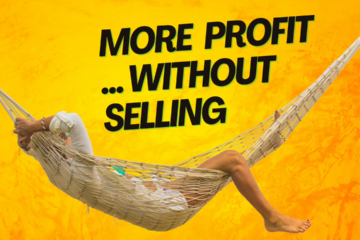I’m going to share how you can sell for higher amounts by just changing how you present your price. I’ve personally sold everything from cheap $1 goods to $50,000/month high-end services to $400,000 software.
The way I show pricing to customers means I sell more, for better margins. It’s because I don’t ever justify my pricing.
I’ll give you two case studies at the end, but here’s what you need to understand first:
When you take time justifying and explaining your prices, you’re undermining your own credibility. So unless you’re selling a pure commodity (or want to be viewed as one), explaining your pricing invites unwanted debate and scrutiny.
People Don’t Really Want An Explanation
When someone asks “why are you charging so much?” it’s not out of curiosity. It’s an attempt to box you in to defending a lower price.
Even clients who genuinely want to understand your pricing model don’t actually care about the details. They want to know that your pricing will get them the results they want.
But the nuts and bolts? Details that don’t matter to them – unless you let those details become the focus.
By launching into a detailed explanation of your pricing methodology, you’re just opening yourself up to nitpicking … Instead of guiding the conversation towards what they want and need, and how you’ll get them there for a price that makes sense.
Justifications Signal Weakness
When you justify, you’re subtly communicating that the other person is right to question it. You’re validating their skepticism. You’re implying that there is something to defend.
A strong positioning doesn’t require defense. It stands on its own.
You’re choosing whether or not you own the frame in the negotiation.
You should have sound reasons behind your pricing, but that’s for you – not for them. Once you’re explaining why, they’re owning the frame. And your close rate will go down.
People Value What Costs More
Think of the ultra-expensive restaurants. They don’t stop you at the door to explain about why a steak costs $200.
The pricing communicates exclusivity and quality on its own.
There’s a perception that things that cost more must be better. Unless you’re competing on being the budget option, you want to be at the high-end of your niche.
Higher prices attract premium clients who value themselves and their time.
That goes for both products and services.
People Buy For Emotional Reasons
At the end of the day, people buy based on emotion more than logic. They might use your pricing explanation as an intellectual justification, but it’s not why they buy.
They buy because they feel you understand their problem, your product or service the right one to solve it, and that it will improve their life or business.
So instead of DEFENDING your prices, show value in the emotions you evoke. Explain how much better their life will be after working with you. Get them excited about the possibilities.
When you’ve made an emotional connection, the price objection usually disappears.
Two experiments I ran that demonstrate this:
- In my agency I went from justifying low fees line by line – to doubling fees, framing by results not deliverables, and not breaking out why. Result: Increased close rates 23% and better clients.
- In one of my ecommerce businesses, increased prices 40% and removed the feature grid. Focused on the “why” of the purchase. Zero decrease in sales volume, the increase was all profit.
If you don’t believe me, then it’s likely because you haven’t tried. But once you do, you’ll never want to go back to begging for business and justifying your worth.

